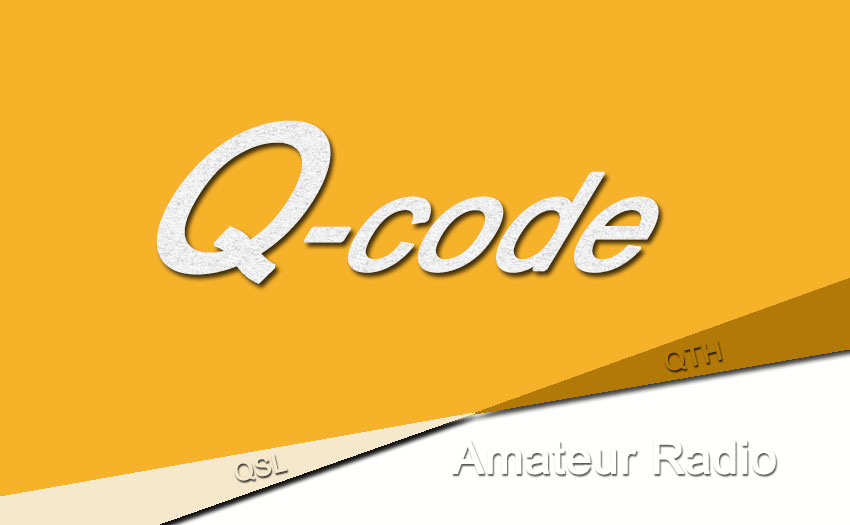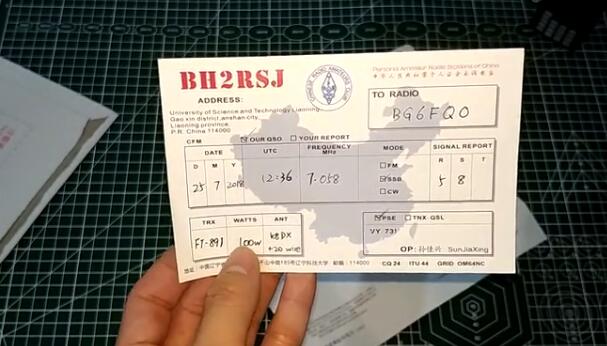+86 15093323284 hams@ailunce.com
Amateur Radio International Q-Code

We always say QSL card. We know it indicates that we communicate a ham on the air successfully. Every time after we have a communication with another ham, we hope to get a QSL card from him. The QSL numbers is just like an honor. Do you know why we use the QSL? Do you know the Q-code in amateur radio?

The Q-code is an international set of abbreviations that was created at the beginning of the last century to simplify radiotelegraph communication. Each code is composed by three letters always starting with Q. Each code can be a question if followed by a question mark or an answer (or statement) if not. To avoid confusion, no station call-sign begins with Q. Even if initially designed for telegraphy, it's also used in voice communications.
Q-codes were adopted by amateur radio operators in December 1915. In amateur radio, the Q-codes were originally used in Morse code transmissions to shorten lengthy phrases and were followed by a Morse code question mark (··— —··) if the phrase was a question. Q-codes are also commonly used in voice communications as shorthand nouns, verbs, and adjectives making up phrases.
Amateur radio operators use a subset of the full international Q-code and they use it extensively still today. Hereunder the most common codes.
| Code | Question | Answer or Statement |
|---|---|---|
| QNI | May I join the net? | You may check in... |
| QRA | What is the name (or call sign) of your station? | The name (or call sign) of my station is ... |
| QRG | Will you tell me my exact frequency (or that of ...)? | Your exact frequency (or that of ... ) is ... kHz (or MHz). |
| QRH | Does my frequency vary? | Your frequency varies. |
| QRI | How is the tone of my transmission? | The tone of your transmission is (1. Good; 2. Variable; 3. Bad) |
| QRJ | How many voice contacts do you want to make? | I want to make ... voice contacts. |
| QRK | What is the readability of my signals (or those of ...)? | The readability of your signals (or those of ...) is ... (1 to 5). |
| QRL | Are you busy? | I am busy. (or I am busy with ... ) Please do not interfere. |
| QRM | Do you have interference? [from other stations] | I have interference. |
| QRN | Are you troubled by static? | I am troubled by static. |
| QRO | Shall I increase power? | Increase power. |
| QRP | Shall I decrease power? | Decrease power. |
| QRQ | Shall I send faster? | Send faster (... wpm) |
| QRS | Shall I send more slowly? | Send more slowly (... wpm) |
| QRT | Shall I cease or suspend operation?/ shutoff the radio | I am suspending operation. /shutting off the radio |
| QRU | Have you anything for me? | I have nothing for you. |
| QRV | Are you ready? | I am ready. |
| QRW | Shall I inform ... that you are calling him on ... kHz (or MHz)? | Please inform ... that I am calling him on ... kHz (or MHz). |
| QRX | Shall I standby / When will you call me again? | Please standby / I will call you again at ... (hours) on ... kHz (or MHz) |
| QRZ | Who is calling me? | You are being called by ... on ... kHz (or MHz) |
| QSA | What is the strength of my signals (or those of ... )? | The strength of your signals (or those of ...) is ... (1 to 5). |
| QSB | Are my signals fading? | Your signals are fading. |
| QSD | Is my keying defective? | Your keying is defective. |
| QSG | Shall I send ... telegrams (messages) at a time? | Send ... telegrams (messages) at a time. |
| QSK | Can you hear me between your signals? | I can hear you between my signals. |
| QSL | Can you acknowledge receipt? | I am acknowledging receipt. |
| QSM | Shall I repeat the last telegram (message) which I sent you, or some previous telegram (message)? | Repeat the last telegram (message) which you sent me (or telegram(s) (message(s)) numbers(s) ...). |
| QSN | Did you hear me (or ... (call sign)) on .. kHz (or MHz)? | I did hear you (or ... (call sign)) on ... kHz (or MHz). |
| QSO | Can you communicate with ... direct or by relay? | I can communicate with ... direct (or by relay through ...). |
| QSP | Will you relay a message to ...? | I will relay a message to ... . |
| QSR | Do you want me to repeat my call? | Please repeat your call; I did not hear you. |
| QSS | What working frequency will you use? | I will use the working frequency ... kHz (or MHz). |
| QST | – | Here is a broadcast message to all amateurs. |
| QSU | Shall I send or reply on this frequency (or on ... kHz (or MHz))? | Send or reply on this frequency (or on ... kHz (or MHz)). |
| QSW | Will you send on this frequency (or on ... kHz (or MHz))? | I am going to send on this frequency (or on ... kHz (or MHz)). |
| QSX | Will you listen to ... (call sign(s) on ... kHz (or MHz))? | I am listening to ... (call sign(s) on ... kHz (or MHz)) |
| QSY | Shall I change to transmission on another frequency? | Change to transmission on another frequency (or on ... kHz (or MHz)). |
| QSZ | Shall I send each word or group more than once? | Send each word or group twice (or ... times). |
| QTA | Shall I cancel telegram (message) No. ... as if it had not been sent? | Cancel telegram (message) No. ... as if it had not been sent. |
| QTC | How many telegrams (messages) have you to send? | I have ... telegrams (messages) for you (or for ...). |
| QTH | What is your position in latitude and longitude (or according to any other indication)? | My position is ... latitude...longitude |
| QTR | What is the correct time? | The correct time is ... hours |
| QTU | At what times are you operating? | I am operating from ... to ... hours. |
| QTX | Will you keep your station open for further communication with me until further notice (or until ... hours)? | I will keep my station open for further communication with you until further notice (or until ... hours). |
| QUA | Have you news of ... (call sign)? | Here is news of ... (call sign). |
| QUC | What is the number (or other indication) of the last message you received from me (or from ... (call sign))? | The number (or other indication) of the last message I received from you (or from ... (call sign)) is ... |
| QUD | Have you received the urgency signal sent by ... (call sign of mobile station)? | I have received the urgency signal sent by ... (call sign of mobile station) at ... hours. |
| QUE | Can you speak in ... (language), – with interpreter if necessary; if so, on what frequencies? | I can speak in ... (language) on ... kHz (or MHz). |
| QUF | Have you received the distress signal sent by ... (call sign of mobile station)? | I have received the distress signal sent by ... (call sign of mobile station) at ... hours. |
Refer to wikipedia.org












ClintonVable
I came across an article that talks about the same thing but even more and when you go deeper.